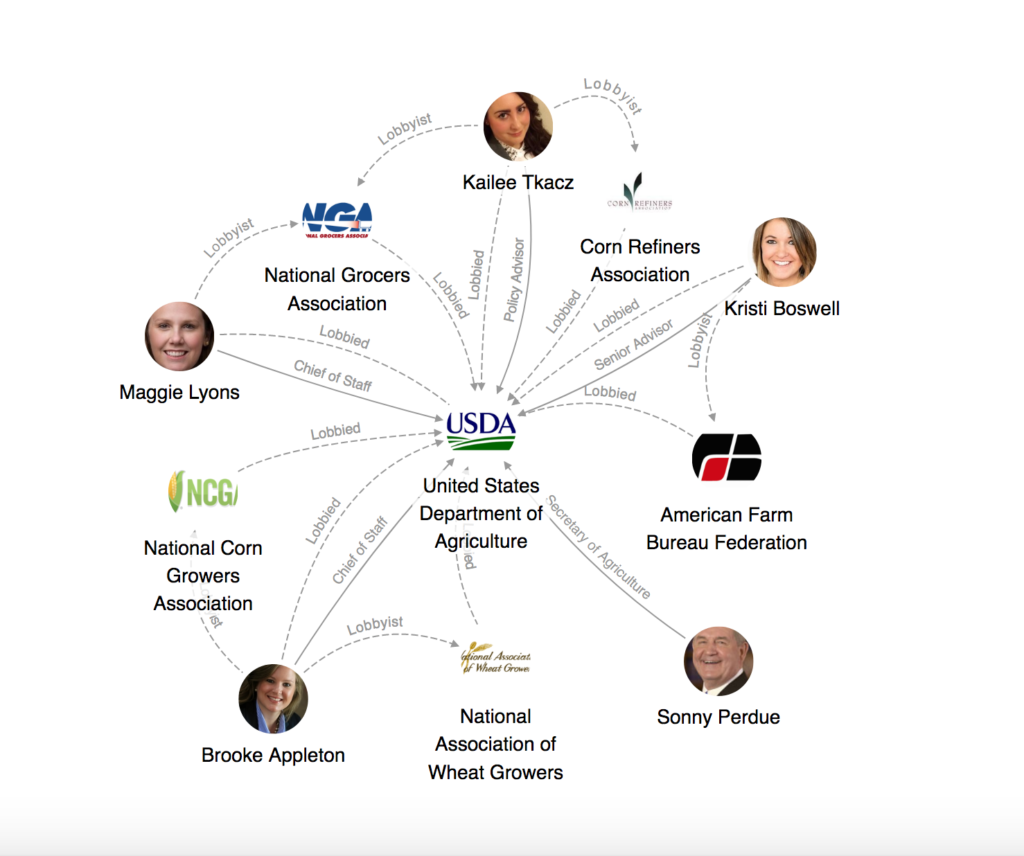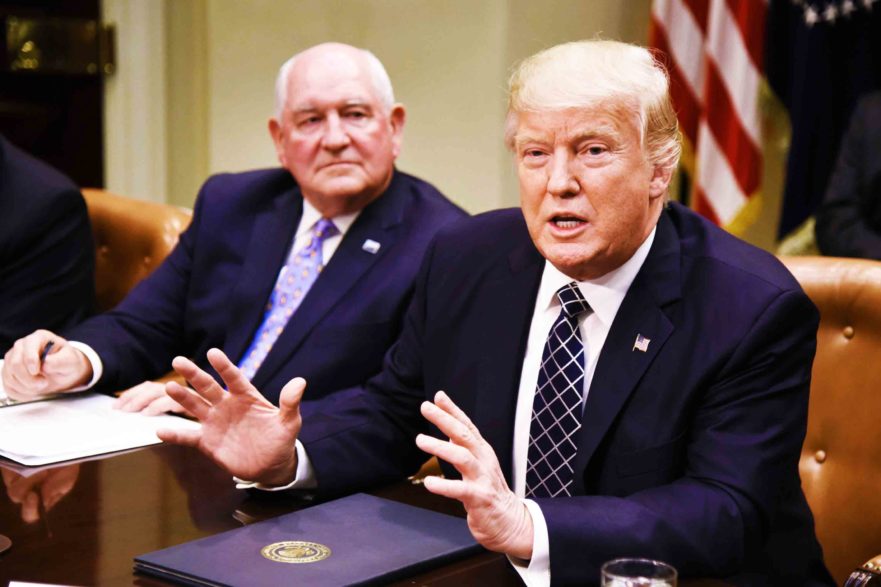President Donald Trump with Agriculture Secretary Sonny Perdue in the White House on April 25, 2017. Photo by Olivier Douliery-Pool/Getty Images.
By Alex Kotch
Three White House ethics waivers released this month show that former food industry lobbyists are helping shape policy by advising top officials at the U.S. Department of Agriculture. The waivers, issued by White House counsel Donald McGahn, allow three recent lobbyists for trade groups including the National Grocers Association, the National Corn Growers Association, and the American Farm Bureau to advise the agency on the very matters that they recently lobbied—matters that impact the profits of the companies that these associations represent.
The ex-lobbyists are working on welfare programs administered by the USDA, provisions in the 2018 Farm Bill, and seasonal agricultural worker policy. The results could exclude people from food stamps, weaken conservation programs, and remove protections for farmworkers.

At least four recent food industry lobbyists—from the grocers, wheat, corn and corn syrup industries—joined the USDA in 2017 and received ethics waivers to work on the very issues they had lobbied on.
The waivers represent a significant number of industry lobbyists within the USDA, appointed by President Donald Trump and Agriculture Secretary Sonny Perdue, who present direct conflicts of interest. Because of these conflicts, McGahn produced the ethics waivers, allowing the recent lobbyists to do work that, ordinarily, would be considered unethical.
This reporter previously revealed that a corn syrup industry lobbyist received a waiver to advise the USDA on the nation’s Dietary Guidelines. Kailee Tkacz, who had previously lobbied for the Snack Food Association and the National Grocers Association and worked for the American Legislative Exchange Council, was hired in July 2017.
Another lobbyist, Maggie Lyons, was also hired in July, leaving the National Grocers Association to become a senior advisor and chief of staff to another appointee, Brandon Lipps, now the administrator of the USDA’s Food and Nutrition Service. The next day, McGahn issued an ethics waiver for Lyons to advise Perdue and other USDA officials on the Supplemental Nutrition Assistance Program (SNAP) and the Women, Infants and Children (WIC) Program, policies on which she lobbied just months earlier. This waiver was only made public on March 7, 2018 via the Office of Government Ethics website.
Claiming that Lyons’ limited waiver was “in the public interest,” McGahn wrote that “Ms. Lyons’ deep understanding of Congress and the SNAP and WIC programs make her an ideal person to assist the Secretary of Agriculture and his senior leadership team to make SNAP and WIC more efficient and effective.” Lyon’s LinkedIn page shows that she studied corporate communications in college and appears to have no background in science or nutrition.
As recently as the second quarter of 2017, Lyons lobbied the USDA and Congress on SNAP, which the USDA’s Food and Nutrition Service administers. In the fourth quarter of 2016, Lyons lobbied the USDA and Congress on WIC and on legislation modifying the National School Lunch Program, a program she reportedly helps run.
In February, Perdue unveiled a controversial plan to send food to SNAP recipients in a “Harvest Box,” dramatically reducing the benefits recipients currently receive to purchase food from their local grocers, in an effort to save $130 billion in government spending over 10 years. When Lipps presented the idea at an anti-hunger conference, he was met with a chorus of boos. Such a program could favor producers that have the closest ties to the USDA—including the businesses that were represented by recent lobbyists now advising the secretary on nutrition issues. However, the Grocers Association opposes the idea.
In December, Perdue implied that he’d like to exclude the working poor from SNAP. “I think one of the things that you’ll see probably is a change regarding the ability for able-bodied, working adults or adults without dependents to rely on food stamps continually.”
Lyons’ husband, Troy Lyons, also exemplifies the revolving-door problem between lobbying and government. Having lobbied for gas company BP for four years, then Hess for two years, he joined the Environmental Protection Agency’s Office of Congressional and Intergovernmental Relations as an associate administrator last year.
Another USDA advisor whose ethics waiver was made public on March 7 is Brooke Appleton, who joined the agency as the chief of staff to the deputy secretary of the USDA after three years of lobbying for the National Corn Growers Association and, before that, nearly three years with the National Association of Wheat Growers. McGahn granted her a waiver in December allowing her to advise agency officials on the 2018 Farm Bill, which funds SNAP, and the USDA’s Conservation Reserve Program, Conservation Stewardship Program, Environmental Quality Incentives Program, and Regional Conservation Partnership Program.
For the Corn Growers group, as recently as the third quarter of 2017, Appleton lobbied the USDA and Congress on numerous elements of the Farm Bill including “conservation programs,” “funding for mandatory programs,” and funding for a program that subsidizes overseas marketing and promotions of U.S. agricultural products. She also lobbied on air quality standards and “development of carbon and water quality trading programs at USDA.”
“It’s interesting to see a corn and wheat lobbyist advising the USDA on conservation programs,” Karen Perry Stillerman, a senior analyst in the Food & Environment Program at the Union of Concerned Scientists, told TYT. “The need for conservation isn’t necessarily in line with the desire to produce as much corn as possible. Monocultures of a few crops don’t give you the best conservation outcomes . . . Crop diversification helps farmers reduce erosion and fertilizer runoff while increasing yields and maintaining profits.”
Appleton’s LinkedIn profile does not indicate any expertise in conservation or the environment. She studied agribusiness management in college and worked for House Republicans and food industry trade groups before joining the USDA.
In another potential conflict of interest, Appleton’s husband, Seth Appleton, who works at the Department of Housing and Urban Development, has investments in agriculture giant Monsanto and in Caterpillar, which manufactures machines for farming, according to his most recent financial disclosure.
Also lobbying alongside Appleton last year was Leslie McNitt, who left the USDA to direct public policy for trade and biotechnology for the Corn Growers Association in February 2017.
The third ex-lobbyist whose USDA ethics waiver recently surfaced is Kristi Boswell, who spent over five years lobbying for the American Farm Bureau Federation. In May 2017, she received a waiver to advise Perdue on the Department of Labor’s H-2A visa program, which addresses seasonal agricultural workers. McGahn wrote that it is in the public interest for Boswell to “participate personally and substantially” in H-2A visa matters because of her “knowledge and expertise analyzing the laws and regulations comprising the . . . visa program, combined with her experience working with American farmers and understanding their unique labor needs.”
As recently as the first quarter of 2017, Boswell lobbied Congress, the Labor Department, and the Occupational Safety & Health Administration in support of a bill that would have allowed employers to exclude H-2A workers from the definition of “full-time employees.” This would allow some employers to avoid abiding by the Affordable Care Act’s employer mandate, which fines businesses with at least 50 employees if they fail to offer them minimum essential health care coverage. She also lobbied Congress on H-2A appropriations requests and on farm labor housing appropriations.
Before joining the Farm Bureau, Boswell was a corporate attorney who defended “clients in general corporate litigation matters including workers’ compensation, creditor rights, and employment discrimination claims,” according to her LinkedIn page.
Agriculture Secretary Perdue himself has a personal interest in the agriculture industry. He holds ownership stakes in grain company AGrowStar LLC, Houston Fertilizer and Grain Co., and ProAg Products LLC, according to his 2017 financial disclosure. Perdue was accused of mixing his business interests with politics during his eight-year tenure as governor of Georgia.
The National Grocers Association was excited by Perdue’s appointment as USDA secretary. Senior lobbyist Greg Farrara said in 2017, “Mr. Perdue was an advocate for grocers during his tenure as governor of Georgia and we look forward to working with him in this capacity to decrease the regulatory burdens placed on independent supermarket owners and operators, allowing our member companies the ability to continue to run their businesses with limited government interference and serve their communities.”
By appointing a host of food industry lobbyists to USDA positions, it appears Perdue is fulfilling the Grocers Association’s wishes.
Trump issued ethics rules in January 2017 of last year, weakening those of the Obama Administration. The previous president required that, without a waiver, lobbyists could not join an agency they had lobbied in the previous two years. Trump’s rule permitted this scenario, only requiring a waiver if the lobbyist-turned-staffer were to work directly on an issue that they had lobbied within two years of their appointment. Trump’s rules on ethics waivers mirror those of former President Bill Clinton, but removes the mandate that waivers be published in the Federal Register. And unlike the Obama administration’s rules, Trump’s do not require annual reports on compliance. In all, the Office of Government Ethics’ website lists 24 waivers issued by McGahn, but this doesn’t include many other recent lobbyists who work in the Trump administration, some of whom should have waivers in order to do the work they’ve been assigned at their respective agencies, according to the Campaign Legal Center.
Craig Holman, a government affairs lobbyist on campaign finance and ethics for the liberal nonprofit Public Citizen, found 32 ex-lobbyists in the Trump administration with conflicts of interest who hadn’t received ethics waivers. Now he says that roughly one-quarter of all Trump appointees were previously lobbyists.
“These waivers directly fly in the face of the letter and spirit of the ethics executive order,” Holman told TYT. “The purpose of this particular provision . . . is to ensure that ‘hired gun’ lobbyists do not use their new positions in government to continue carrying through with their lobbying campaigns on behalf of their former paying clients.”
“Waivers are supposed to be issued infrequently, and only when no one else could fill those shoes. Each of these positions could easily be filled by other experts in the agricultural industry who do not bring with them conflicts-of-interest baggage.”
“These waivers of ethics rules fit a pattern of sidelining science in favor of the food industry,” said Stillerman, referencing a 2017 Union of Concerned Scientists report that mapped the numerous ways that the Trump administration has “waged a war on science.”
“When the USDA creates programs based on science, that prioritizes the well-being of all of us and makes our communities and our country stronger,” she said.
The USDA did not immediately respond to requests for comment.
Alex Kotch is an investigative reporter whose work has previously appeared in International Business Times, Vice.com, and Exposed by CMD. Follow him on Twitter.
Follow TYT Investigates on Twitter, Facebook, and YouTube to stay on top of exclusive news stories from The Young Turks.

